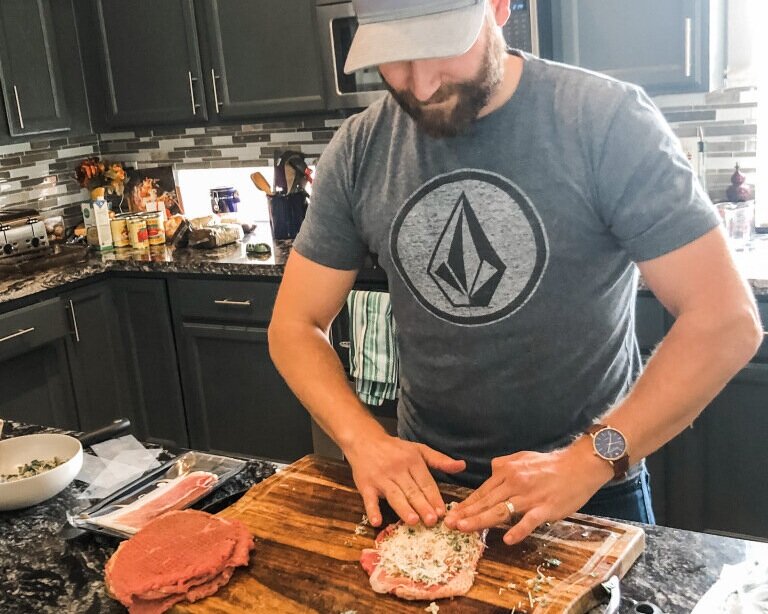Something occurred recently that caused me to reflect on how my bent towards perfectionism has affected my marriage. Perfectionists are used to being told that they’re too hard on themselves, but what happens when that critical voice broadens its scope to include their loved ones? A recent interaction with my husband helped me see the harm that can be done in a marriage when the inner critic begins to direct its unrealistic chatter towards a spouse.
My family was gathered around the table discussing parenthood when I shared that my husband sends the kids to me every time they have a request that requires the answer, “no.” I complained that I was tired of being the “bad guy,” and that I believe it’s only fair that we share the responsibility of setting limits and delivering answers our kids don’t want to hear. Without skipping a beat, Pete responded earnestly, “I’m scared that if I give the kids an answer you don’t agree with, then I”ll be in trouble with you, so I have them ask for your permission in order to stay out of trouble.” We all laughed at his candidness, and I didn’t argue his point. It’s true that I have a specific idea of how some things should be done, especially when it comes to parenting. The perfectionist in me admits that I tend to default to: my way equals the right way. I’ve always recognized this in myself, however, it wasn’t until Pete gave me his honest feedback that I really had an “a-ha” moment.
My husband’s admission got me to thinking that:
-
My tendency to have a critical nature towards his decisions can sometimes steal his ability to co-parent with me. While trying to avoid my criticism, he’s inclined to parent from behind me rather than alongside me.
-
If I was willing to let go of the reins, I would be gifting my husband the freedom and confidence to parent our kids without my permission, and this would remove the pressure I feel to be the family’s primary point of contact for most decisions and subsequent actions.
-
Maybe my husband and I are not alone in this dynamic. Maybe there are other fellow perfectionists who have yet to realize the consequences of an inner critic going rogue and shifting its gaze on external targets.
I’ve heard men say that they feel like they can’t do anything right, and I’ve heard women complain that their husbands seem incapable of figuring anything out on their own. Ladies, is it possible that some of us are creating an unproductive cycle with our perfectionism and need for control? Is it possible that we’re unintentionally creating disconnect with the unrealistic, and quite frankly, unfair expectations that our husband’s live their lives and take care of the kids and the house and their work and themselves in the same way we do? Is it possible that we sometimes send a message that says, “I don’t trust you to make the right decision, therefore you should ALWAYS check with me first?” Is it possible that we’re inadvertently attempting to parent the adult who is supposed to be our partner in raising our children? In my case, to some degree, and at one time or another, I have to respond yes to a few of these questions.
As hard as it is to admit, I think I’ve discovered that some of the frustrations in my marriage are by my own unconscious doing. I have established a dynamic, where the things that aggravate me the most are actually things I’ve unintentionally created with the, “my way or the highway” approach. Due to my tendency to often insist that things be done a certain way, the following patterns have shown up in our home, and maybe some of you can relate:
-
The popular, “go ask your mom.”
If I’m trying to avoid decision fatigue, then I have to stop implying that decisions made without my input are wrong ones. If I criticize my husband’s choices too often, then I end up sending the message, “it would be easier for all of us if you just left the judgment calls to me.” In order for decision-making to be a shared task, and in order to divide the responsibility of giving our kids answers they don’t want to hear, I have to let go of control and remove my need to critique.
-
The chronic forgetfulness of everyday items.
It doesn’t matter where I set our son’s water bottle (which has gone with him to school every day for 3.5 years), my husband WILL forget to bring it with him. I’ve put it on my husband’s laptop, inside my son’s shoes, INTO MY HUSBAND’S LIVING MOVING HANDS, and he still manages to forget the cup. It’s as if he goes out of his way to NOT remember it. It’s a dark magic ladies!
Here’s the thing I’ve realized though: As long as I insist that certain things are “my things,” the less likely it is that my husband will offer to take responsibility for them. From the very inception of our little family, I have taken on the role of packing the diaper bag, the overnight bag, the suitcase, the backpack, and so on. I’ve convinced myself that if my husband was in charge, he would forget something, so it’s better if I just take care of it. It may be true that he would fail to remember something, but with consistent practice I believe he would be less forgetful. Mommy’s with little ones pack a diaper bag every single day, and after awhile it’s second nature…it’s habit. When dads only have the opportunity to pack a bag while mom is traveling for work, it makes sense that they can’t do it on autopilot, and that they are more likely to miss something.
3. The questions I know my intelligent husband is more than capable of answering himself.
“Where are Sonoma’s bed sheets?” Let’s see…we know they’re probably not in the fridge, the garage, the attic, the bathtub. There are a few plausible places: the linen closet, Sonoma’s closet, the drawer that pulls out from under her crib, which was made to hold bed sheets!
“Do the kids need a bath?” Honey, how do you gauge when it’s time for you to clean your own body? Do they smell? Is there sand in their hair? Has it been 4 days? Did they recently get sweaty or do anything active? If you answer yes to any of those questions, then please, for the love of God, bathe the children.
Again, I believe this goes back to deferring to me because I’ve insisted that I be in charge of certain things. I’ve unintentionally encouraged my husband to yield certain responsibilities to me because I’ve decided that I fold the linens better, I know where things “should” go, I’m a better judge of when a bath is necessary?? Really?! Who do I think I am?
Ladies, I have no other choice but to conclude that I’m partially responsible for my own frustrations. In an effort to make sure things are done timely, and done the way I believe they should be done, I’ve taught my husband to relinquish some of his independence and question his self-sufficiency. I’ve disempowered him when it comes to certain areas of parenting, and I’ve unintentionally led him to believe that if he does anything or chooses anything without my approval, he may get it wrong, and the price to pay is my frustration, and sadly at times, my disgust. What if he says “no” to our children and I think he should’ve said, “yes?” Or worse, what if he says, “yes” when I think he should’ve said, “no?” My husband deserves better from me. The truth is that he is an amazing partner and an incredible father in so many ways, and he should feel confident in who he is.
-
He remembers garbage days and I have NO idea what days those are.
-
He gets things done quickly and does not procrastinate.
-
He takes care of our kids while I travel for work without a mention that it’s difficult or that I owe him anything.
-
He parents from a place of empathy that helps keep our home balanced and centered.
-
He’s so much fun and there is NEVER a shortage of laughter in our home.
-
He enjoys housework and does all the cooking. FULL STOP! How lucky am I?!?!?
He’s a loving father.
He’s so much fun!
He’s a present father.
He loves to cook!!!
He may not know where the kid’s bedsheets are, what time they nap, or when lunchtime has been for the last 6 years, BUT he knows what their hearts need…he knows how to love them unconditionally…he knows what makes them tick and how to avoid their triggers, he knows when I’m grieving my mom and just need to be held, he knows when it’s time for a breather and when it’s time to press in, he knows what his family needs from a father and a spouse.
I realize now how unfair it is to expect him to take more initiative and make decisions more independently, when at the same time I often criticize him for how he does things, and jump on him for not “partnering” with me when he makes decisions without me. He can’t win this way…our marriage can’t win this way. I MUST encourage his efforts and be grateful vs. picking apart his choices. If I want him to feel free to do things without asking me how they should be done, I have to STOP insisting that everything be done my way. I’ve been too critical at times. I want to be more intentional about letting go of the reins and providing a growing space for healthy co-parenting.
As I reflect on this lesson I’m understanding that unchecked perfectionism can cause an unintentional wedge in a marriage, and I’m determined to try a new approach in 2020 for a healthier relationship with my husband. Below are some husband-approved ways we can all be more intentional about how we relate to our spouses.
10 Ways to Protect A Marriage From the Pitfalls of Perfectionism:
-
If your spouse makes a decision or takes a course of action that differs from the choice you would have made, let it be. If it doesn’t cause harm, let it go.
-
Start affirming. Stop criticizing.
-
Offer encouragement when your spouse takes care of something without asking you first, even if they do it in a way you find less than perfect.
-
Make a list of all the things you love and appreciate about your spouse and share that list with them. Repeat as needed.
-
Say thank you.
-
Flip the script and ask for your spouses input, seek their opinion, try it their way.
-
Praise/honor your spouse in front of others.
-
Check your tone. Speak to your spouse with the love, kindness, and respect you desire to hear from them.
-
Encourage your spouse to make decisions, and then provide them with positive feedback.
-
Admit your own mistakes and offer yourself forgiveness. When we’re willing to forgive ourselves, then we’re more likely to open the door for forgiveness of others.
As I’ve taken inventory on the ways my perfectionism has negatively impacted my marriage I’ve gained insight that has helped me release much of my frustration, and I feel better prepared to move towards a healthier marriage in 2020. My hope is that by sharing this difficult lesson-learned, I can help others avoid the pitfalls I was previously unaware of. I pray that your marriage will be protected from the critical voice of perfectionism and that your partnership will be blessed with kindness, love, and grace.
If you have other ideas that have helped protect your marriage from the pitfalls of perfectionism, please share.






Be the first to comment